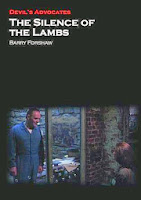 finds energy and hours enough to edit Crime Time magazine as well as appear (in his trademark dark suits) on television programs and in DVDs examining the genres he loves.
finds energy and hours enough to edit Crime Time magazine as well as appear (in his trademark dark suits) on television programs and in DVDs examining the genres he loves.Most of us in the British crime- and thriller-fiction community are familiar with his book reviews, film criticism, and articles, and also with his more recent involvement with Nordic crime fiction. (That latter interest stemmed largely from his being the first biographer of Stieg Larsson.) Mention must be made as well of the fact that Forshaw edited the invaluable resource British Crime Writing: An Encyclopedia (2009), drawing together contributions from many of his fellow writers and reviewers. I was one of those people, and the published two-volume work sits proudly on my bookshelf.
A little while back, Barry contacted me because he knows of my longstanding devotion to the work of Thomas Harris, and that I first corresponded with the reclusive Harris a few decades ago. Barry had been commissioned by Auter Publications to pen a critical examination (for Auter’s Devil’s Advocate line) of The Silence of the Lambs--both Harris’ 1988 novel and director Jonathan Demme’s subsequent film adaptation (scripted by Ted Tally). Barry has since completed that examination, the publication of which was timed to coincide with the 25th anniversary of the debut of The Silence of the Lambs, a work that really changed the direction of the crime novel, moving it toward the Gothic horror side of the street. I would urge you to purchase a copy of Random House UK’s 25th anniversary edition of Silence, if only to enjoy Harris’ short but interesting new introduction. I also can’t speak highly enough of Barry Forshaw’s Auter study of that novel, an excellent companion to one of this genre’s milestone works.
 But don’t just take my word for it; read Paul Worts review, written in association with Film Four’s Frightfest Festival:
But don’t just take my word for it; read Paul Worts review, written in association with Film Four’s Frightfest Festival:
To coincide with the 25th anniversary of the publication of Thomas Harris’s novel ‘The Silence of the Lambs’, Auteur Publishing have released a new addition to their Devil’s Advocates series. Author Barry Forshaw begins with a look into the origins and inspirations for writer Thomas Harris’s first foray into the twisted mindset of Dr. Hannibal Lecter, (‘Red Dragon’ 1981) and the subsequent film adaptation by Michael Mann. He then dissects the world-famous follow-up novel and Oscar winning screen interpretation directed by Jonathan Demme and continues on his dissection of the Lector legacy with the resulting ‘Hannibal’ and ‘Hannibal Rising’ novel and films (not forgetting the almost entirely forgettable 2002 film ‘Red Dragon’), and ending up with the current television series: ‘Hannibal’.In the wake of my excitement over Forshaw’s book and Harris’ novel, I recalled a presentation Barry gave during the Crime Writers’ Association’s 60th anniversary party in London, held on Guy Fawkes’ Night (November 5). It found Barry yet again playing devil’s advocate.
Little is known about the less than prolific (5 novels in 38 years) author Thomas Harris. Refusing to give interviews or even do book signings, the most significant detail we do know is that as an editor and reporter he covered crime-related events and he spent time at the F.B.I. researching serial killers for his second novel: ‘Red Dragon’(1981). Whilst there he (naturally) came across the case of our old friend, the famous farmer fiend from Wisconsin, Ed Gein. Forshaw wastes little time in wheeling out the well-known and well-worn influences Gein had on both Robert Bloch’s novel ‘Psycho’ and Hitchcock’s cinematic masterpiece. However, to his credit, Forshaw also includes lesser-known works such as Jack Smight’s ‘No Way to Treat a Lady’ (1968), and suitably tips his hat to the giallo works of Bava and Argento in particular in filmic influences.
The celebration was opened by current CWA chair Alison Joseph, who announced the hotly anticipated results of a CWA poll meant to determine the foremost author and books in this genre. In case you’ve forgotten, here are the winners:
CWA Best Ever Novel:
The Murder of Roger Ackroyd (1926), by Agatha Christie
CWA Best Ever Crime Author: Agatha Christie
CWA Best Ever Crime Series:
Sherlock Holmes, from Arthur Conan Doyle
Barry’s job that evening was to moderate a panel debate, which featured fellow writers David Stuart Davies, Belinda Bauer, and Zoë Sharp. They discussed and dissected the “greats” in the crime, mystery, and thriller field. Barry proved to be rather mischievous, reiterating all-too-familiar knocks against the masters (Agatha Christie just wrote puzzle books, some of Raymond Chandler’s work had no discernible plot, Thomas Harris was solely responsible for the glut of serial-killer novels, etc.). Barry admitted to me later that he was concerned attendees who didn’t realize he had planned to play devil’s advocate might be offended by his approach. And in fact, there were some negative murmurs behind me, with listeners disturbed that Barry was being unkind to their “sacred cows,” and a tad flippant--though that was the whole point of the discussion, to provoke heated disagreements. Despite such undercurrents of displeasure, the session was highly amusing and informative, and there were some terrific insights delivered on crime-fiction classics.
I had the chance to film much of the discussion, and you can enjoy the results of that effort below, in three parts:


















1 comment:
The decisions about Agatha Christie and Arthur Conan Doyle reflect their popularity, but is it among the English-speaking world? Or only Europe?
That's very Britain-centered. I say this as someone who began reading Sherlock Holmes books at 15, and Hercule Poirot a few years later.
Whom would we select in the U.S. for these awards? And what writers are esteemed in Asia, Africa, Latin America, the Caribbean, the Middle East?
Post a Comment